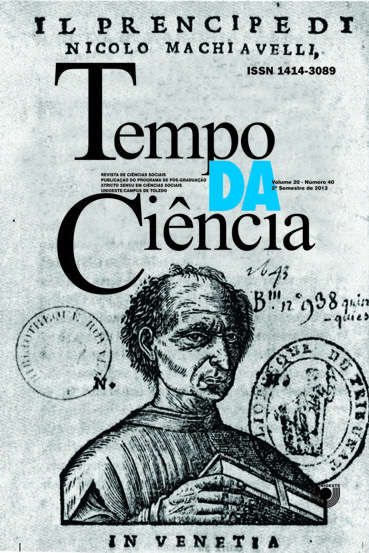Guerra e Politica in Machiavelli
DOI:
https://doi.org/10.48075/rtc.v20i40.10047Keywords:
Machiavelli, Niccolò, War, Politics, Sovereignty, Freedom, Citizenship, Conflict.Abstract
This article deals with the relationship between conflict andpolitics. In ch. 2 it will be shown that conflict is both in the body politicand in its relationship to the outside, and that for Machiavelli war cannotbe thought of separately from politics and vice versa. In ch. 3 it will beargued that before 1512, war played a primary role in Machiavelli’s thoughif compared to politics, and that political power consisted in the State’scapacity to make war. The way in which Machiavelli changed this position14ARTIGO Tempo da Ciência Volume 20 Número 40 2º semestre de 2013radically is the object of ch. 4. In particular, it deals with the decisive roleplayed by the “people”, understood in the most comprehensive meaningof the word, in overturning the relationship between politics and war: warbecomes a moment of the political life and the conquest of new territoriesis meaningful only insofar as the expression of a certain dialectics betweenthe conflicting “parts” within the State. This leads (in ch. 5) to the notionof territorial “border”: it will be shown that, in Machiavelli’s thought, theseparation of inner and outer space, of politics and war, is not absolutebut relative; the border does not separate but unites territories, does notlimit but expands citizenship. At the time when “absolute” borders becamethe foundation of sovereign power in Europe, Machiavelli, throughthe example of Rome, suggested a kind of “porous” border, and associatesit to an idea of “power” as inseparable from freedom.Downloads
Published
How to Cite
Issue
Section
License
Aviso de Direito Autoral Creative Commons
Política para Periódicos de Acesso Livre
Autores que publicam nesta revista concordam com os seguintes termos:
1. Autores mantém os direitos autorais e concedem à revista o direito de primeira publicação, com o trabalho simultaneamente licenciado sob a Licença Creative Commons Attribution que permite o compartilhamento do trabalho com reconhecimento da autoria e publicação inicial nesta revista.
2. Autores têm autorização para assumir contratos adicionais separadamente, para distribuição não-exclusiva da versão do trabalho publicada nesta revista (ex.: publicar em repositório institucional ou como capítulo de livro), com reconhecimento de autoria e publicação inicial nesta revista.
3. Autores têm permissão e são estimulados a publicar e distribuir seu trabalho online (ex.: em repositórios institucionais ou na sua página pessoal) a qualquer ponto antes ou durante o processo editorial, já que isso pode gerar alterações produtivas, bem como aumentar o impacto e a citação do trabalho publicado (Veja O Efeito do Acesso Livre).
Licença Creative Commons
Esta obra está licenciada com uma Licença Creative Commons Atribuição-NãoComercial-CompartilhaIgual 4.0 Internacional, o que permite compartilhar, copiar, distribuir, exibir, reproduzir, a totalidade ou partes desde que não tenha objetivo comercial e sejam citados os autores e a fonte.


